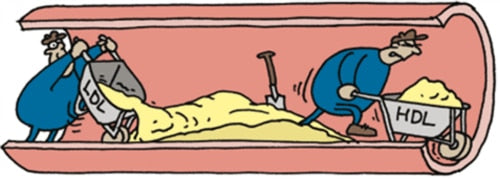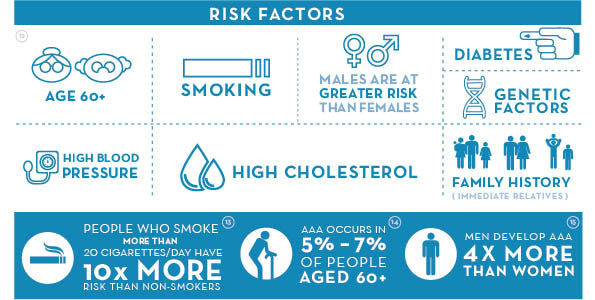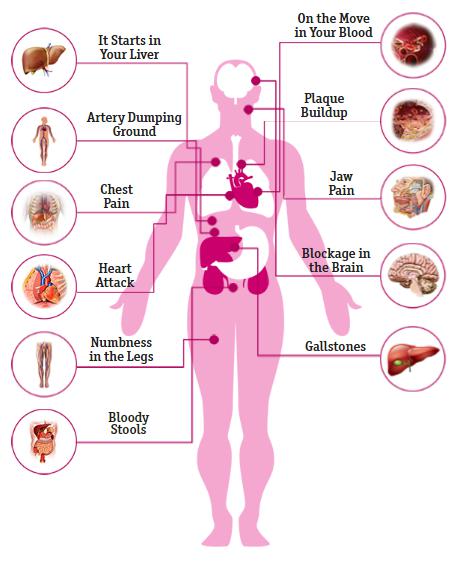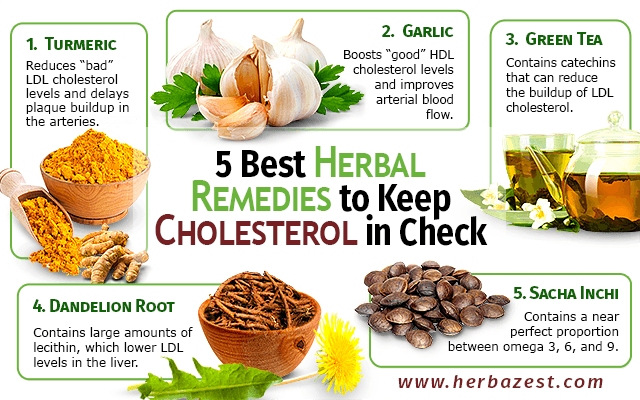What Causes High Cholesterol & 10 Ways To Lower Your Cholesterol

Cholesterol is a waxy and fat-like substance that appears in every single cell in your body. Your body needs it to create cells, vitamin D, hormones, and substances that help with digestion. In that sense, cholesterol is good for you. However, many people associate high cholesterol with heart problems and for a good reason too.
Cholesterol is delivered throughout the body through the bloodstream by carriers known as lipoproteins made of fat (lipids) and protein. There are two types of lipoproteins that you need to know about: low-density lipoprotein (LDL) and high-density lipoprotein (HDL).
LDL is the "bad" type of cholesterol because it contributes to atherosclerosis: the buildup of fat and plaque in your arteries. That's why cholesterol is so often associated with stuff like heart disease, and obesity. Clogging the arteries restricts blood flow and can result in a variety of nasty health effects.

HDL is the "good" kind of cholesterol because it fights against LDL by carrying it from the arteries and back to the liver. From there, LDL gets broken down and passed through the body.
What Are The Ideal Cholesterol Levels
So, how much cholesterol is good for you? The National Heart, Lung, and Blood Institute issued the following guidelines for those 20 and older:
|
|
|
Total cholesterol |
|
HDL cholesterol |
|
LDL cholesterol |
|
Triglycerides |
|
Good |
|
Less than 200 |
|
40 or higher |
|
Less than 100 |
|
Less than 149 |
|
Borderline |
|
200-239 |
|
n/a |
|
130-159 |
|
150-199 |
|
High |
|
240 or higher |
|
n/a |
|
160 or higher |
|
200 or higher |
|
Low |
|
n/a |
|
less than 40 |
|
n/a |
|
n/a |
The American Heart Association says that those 20 and up should have their cholesterol levels checked every four to six years. Those with higher levels ought to be tested more frequently.
What Can Cause High Cholesterol?
So, what causes your body to have high cholesterol in the first place? The truth is that there are many factors.

- Family history: Risk for high cholesterol levels is often passed down through genetics.
- Age: Cholesterol levels tend to increase around the age of 20, and they continue to rise as you age. An infographic from HeartTruth.gov says that 22% of those in their 20s, 38% of those in their 30s, 50% of those in their 40s, and 62% of those in their 50s have high cholesterol levels.
- Sex: Younger women have lower LDL levels compared to younger men and women who hit puberty have higher HDL levels compared to men of the same age. Men at 45 are the group at highest risk for high cholesterol levels. However, menopause often puts women at higher risk for high cholesterol levels since they won't have estrogen to protect their bodies.
- Diet: Consuming saturated fats, trans fats, full-fat dairy products, and red meat is risky for you. Dangerous foods include lamb, fatty beef, pork, poultry with skin, liver, whole milk, full-fat cheese, full-fat yogurt, ice cream, egg yolk, butter, chocolate, coconut oil, palm oil, and cocoa butter.
- Diabetes: Diabetes contributes to higher levels of sugar in the bloodstream, which contributes to elevated levels of LDL and lower levels of HDL. Excessive sugar also damages the artery walls and carries many heart-related risks that high cholesterol levels do. Luckily, it can be combated through diet and exercise much like high cholesterol levels can.
- Lack of exercise: Regular exercise helps by boosting HDL and increasing the size of LDL particles, making it less harmful. It also helps stave off related conditions like obesity.
- Smoking: Everyone knows that smoking increases your risk of getting lung cancer and other awful conditions, but few people talk about how it can increase your risk of high cholesterol levels. Smoking damages your blood vessel walls which can increase the risk of amassing fatty deposits. It might also lower your body's HDL levels.
- Obesity: Obesity means your body is carrying too many triglycerides and LDL. Men with a waist circumference of at least 40 inches and women with a waist circumference of at least 35 inches are at significant risk for high cholesterol levels.
What Are The Effects of High Cholesterol
What exactly does cholesterol do to your body? There are plenty of bad things. Here are a few:
- Atherosclerosis: This is when your body's LDLs build up fat deposits called plaques in your arteries. The plaques restrict blood flow to vital body parts.
- Blood clots: Sometimes part of the plaque breaks off and gets lodges somewhere in an artery and blocks blood flow. Much like atherosclerosis, this prevents blood from going to where it needs to go.
- Aneurysms: These can occur anywhere in your body when blockage causes a bulge in your arteries. It is considered a medical emergency when you feel pain or throbbing in an affected area as it could burst and cause internal bleeding.
- Heart disease: Blockage in your heart arteries can cause heart disease. One of the most common symptoms is chest pain, but that pain can also spread to the neck, jaw, arms, back, and shoulders.
- Heart attacks: These occur when blood clots in the coronary arteries that prevent oxygen-rich blood from entering the heart valves and the heart becomes starved for oxygen. The cells in heart muscles and die out rapidly and cause permanent damage when this happens. Symptoms include anxiety, weakness, shortness of breath, vomiting, nausea, rapid or irregular heartbeats, indigestion, a feeling of being choked, heartburn, sweating, dizziness, and pain, pressure, or discomfort in the chest, arm, beneath the breastbone, throat, back, or jaw.
- Strokes: Strokes happen when blood clots form in your brain and prevent blood flow. Symptoms include headaches, difficulty in speech, dizziness, temporary vision loss in one eye, drooping face muscles, breathing problems, and numb limbs. These could also be signs of an incoming stroke.
- Chronic kidney disease: Since the kidneys help filter out cells and proteins and dispose of them through excrement, those suffering from late-stage chronic kidney disease often feel a dramatic change in urination frequency. Other symptoms include high blood pressure, trouble concentrating, swelling of hands or feet, nausea, numbness, loss of appetite, itchiness, and even kidney failure.
- Peripheral artery disease: This comes from clogged arteries in the arms or legs. Affected areas might have numbness or weakness, slow nail growth, coldness, wounds that won't heal, shiny skin, change in skin color, and a weak or nonexistent pulse. Perhaps the most common sign is trouble using the limbs or pain when doing so. Those suffering from peripheral artery disease often have pain when walking.
How Can You Prevent Or Lower Your High Cholesterol?
Now that you know all the bad things which come with high cholesterol levels, it's time to learn about how you can prevent such things from happening to you and your body. Fortunately, avoiding high cholesterol levels is easy to do. It just takes a few lifestyle changes and making a few wise decisions each day. For the most part, staying healthy and preventing high cholesterol levels can be done by merely being aware of what causes such high levels and avoiding those risk factors.

- Diet: The easiest way to become a healthier person is by changing your diet. It's as simple as abstaining from unhealthy foods and opting for better meals. Seems easy enough, right? You should aim for healthy fats, fiber, whole grains, fruits, vegetables, and fish. Some options include almonds, walnuts, avocados, pecans, whole grain bread, whole grain flour, whole grain pasta, oatmeal, apples, barley, pears, prunes, salad, asparagus, tuna, cod, and halibut.
-
Turmeric: Turmeric benefits have been better able to lower LDL cholesterol. Curcumin (the active compound in turmeric) is able to control LDL cholesterol and its dangerous effects on arteries through a number of mechanisms. Turmeric can prevent the liver from producing cholesterol, increasing the amount of LDL cholesterol that the liver clears from the body, and prevents the intestines from absorbing it.
Beyond that, studies have also shown that curcumin dramatically lowers inflammation and reduces oxidative damage. Since these two processes, damage blood vessels and cause plaque build-up that can lead to heart attack or stroke, preventing them helps to reduce the progression of atherosclerosis (hardening of the arteries due to cholesterol and plaque build-up). - Healthy fats: Yes, there is such a thing as healthy fat. You can find them in non-processed foods such as almonds, pecans, walnuts, and avocados.
- Fiber: Soluble fiber helps reduce your body's LDL levels and blood pressure as well as protect you against heart disease and obesity. You can find it in several whole grain foods and fruit.
- Whole grains: Start choosing whole grains over white grains and brown rice or quinoa over white rice. Whole grain bread, flour, and pasta all promote good heart health and have a decent amount of protein and fiber to boot. Oatmeal is another great option for your early mornings.
- Fruits and vegetables: Of course, these two categories are a staple in just about any healthy diet. Aim for apples, barley, prunes, and pears if you want items with higher levels of fiber.
- Heart-healthy fish: Some fish such as halibut, tuna, and cod have less fat than other forms of meat. Herring, mackerel, and salmon all have an abundant amount of omega-3 fatty acids which are great for your brain and heart.
- Exercise: The more you exercise, the healthier you'll be, granted you don't injure yourself. You could aim for light activities such as doing cardio for 30 to 60 minutes a day or every other day, or you could seek a workout plan to build muscle. Swim, run, bike, or do whatever else you enjoy. It will put you at less risk for things like cancer, diabetes, depression, insomnia, and so much more.
- Quit smoking: It should be obvious that smoking is terrible for your health and the sooner you quit, the better. Find a 12-step program or an accountability partner if need be. Your health depends on it.
- Take drugs: There are a lot of different drugs for different purposes. Most of them will raise HDL and lower LDL and triglycerides. Ask your doctor which option is best for you.
Cholesterol isn't always a bad thing, but having too much of it can seriously wreck your body's health. It's important to keep track of your cholesterol levels and if you think you have high cholesterol, these remedies may help you lower cholesterol naturally. Keep these things in mind, and you'll live a long, healthy, and happy life.
Also in Health & Wellness

Understanding the Health Benefits of Vitamin D3
Vitamin D3, often hailed as the 'sunshine vitamin', is crucial for maintaining overall health and well-being. It plays a vital role in numerous bodily functions, from bone health to immune system support. However, Vitamin D3 deficiency is alarmingly common, affecting a significant portion of the global population. This blog post explores the importance of Vitamin D3, the risks of deficiency, and the crucial interplay between Vitamin D3 and Vitamin K2.

The World of Cordyceps: Unveiling the History and Health Benefits of a Unique Mushroom








